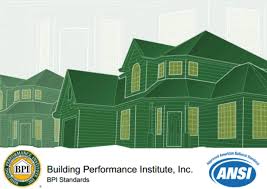Consumer Guide to BPI Home Energy Audits
Download the consumer guide to Building Performance Institute (BPI) comprehensive energy audit standards. AlabamaWISE prefers the term comprehensive home energy assessment to help clarify the in-depth nature of the comprehensive evaluation in contrast to a quick “walk-through” or “clipboard” audit, which are useful, but are not as detailed and do not include diagnostic testing.
Lots of contractors and utility companies offer free in-home or online energy scores for homes. These can be a useful tool for homeowners contemplating a comprehensive home energy assessment by a BPI certified Building Analyst. We recommend the TVA self assessment tool as the first step in evaluating your home’s performance. If the TVA self-assessment tool says you can save, then contact AlabamaWISE for personal advice and referrals to specially trained, BPI-certified contractors.
 A free contractor audit is usually focused on the products sold by the contractor, while a comprehensive assessment to BPI standards identifies ALL cost-effective measures and is a roadmap for homeowners to improve home energy performance during the normal course of home improvement and repair. A comprehensive report empowers homeowners to make informed choices when remodeling kitchens, bathrooms, laundry, siding, windows, doors, crawlspace, basements, attic, roof, heating, air conditioning, ventilation, hot water heaters.
A free contractor audit is usually focused on the products sold by the contractor, while a comprehensive assessment to BPI standards identifies ALL cost-effective measures and is a roadmap for homeowners to improve home energy performance during the normal course of home improvement and repair. A comprehensive report empowers homeowners to make informed choices when remodeling kitchens, bathrooms, laundry, siding, windows, doors, crawlspace, basements, attic, roof, heating, air conditioning, ventilation, hot water heaters.
All AlabamaWISE Building Analysts are certified by the Building Performance Institute to offer unbiased reports with a prioritized list of home energy improvements. The Building Performance Institute, Inc. (BPI) publishes standards for the existing residential building retrofit industry. This Home Energy Auditing Standard is the basis for BPI’s Energy Auditor Certification and provides requirements for the energy-auditing profession. The goal of this standard is to direct the energy auditor to develop a comprehensive list of measures which lead to whole-building, science-based energy improvements to existing detached single-family dwellings and townhouses.
Here is a brief outline of the BPI Energy Audit Standard available for download:
1. Scope
This standard defines the minimum criteria for conducting a building-science-based evaluation of existing detached single-family dwellings and townhouses that have independent mechanical systems for each dwelling unit (heating, cooling, water heating, and ventilation).
The evaluation will address energy usage, and limited aspects of building durability and occupant health and safety. The evaluation report is a comprehensive scope of work to improve the home and will include a cost-benefit analysis.
2. General Energy Audit Requirements
Energy audits shall be based on building science principles and include the use of appropriate equipment in diagnosing opportunities for improving energy efficiency and minimizing health and safety hazards.
3. Health and Safety Related Requirements
All energy audit reports shall include the specific information needed to implement, maintain and/or improve existing levels of health and safety in the home. Additionally, the energy audit report shall identify ways to mitigate identified health and safety hazards.
4. Disclosure and Ethics
The energy audit report shall provide clear and accurate information to customers about energy conservation measures and health and safety improvements.
5. Cost-Benefit Analysis
The energy audit report shall identify estimated energy savings from each feasible measure based on deemed savings or modeled energy performance.
6. Prioritizing Recommendations
The energy audit report shall prioritize recommended improvements in order of cost-effective energy, comfort or indoor air quality improvement.
7. Combustion Appliance Testing
The energy audit report shall include testing for carbon monoxide hazards in every location of fuel-fired appliance, including kitchen and mechanical room.
8. Indoor Air Quality and Ventilation
The energy audit report shall identify current ventilation rate and minimum ventilation required to meet published standards.
9. Moisture Control
The energy audit report shall identify areas where moisture control is required to minimize mold and durability issues.
10. Building Enclosure Performance
The energy audit report shall evaluate the thermal performance of the building enclosure, including measured air leakage, inspection of existing insulation levels and thermal characteristics of windows, doors, walls, foundation and attic.
11. Heating and Cooling (HVAC) Efficiency
The energy audit report shall identify the performance characteristics on existing heating and cooling systems, including duct system performance. Replacement recommendation will include correctly sizing new heating and cooling equipment and duct system design.
12. Baseload Energy Efficiency and Water Conservation
The energy audit report shall identify baseload conservation measures including water conservation measures.


Comments are closed.